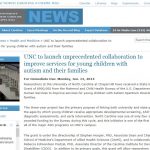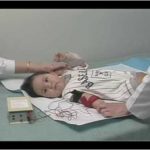Tag: Children

TEACCH School Transition to Employment and Post-Secondary Education Program
As the number of children diagnosed with Autism Spectrum Disorder (ASD) rises, there will be an increasingly large adult population for whom the challenges of gaining productive, long-term employment will likely overwhelm our current adult service programs. Current employment rates for individuals with ASD are low, with only 18% of young adults with ASD reported to be involved in … Read more

The Sensory Experiences Project
To examine the development, functional impact, and cause of various sensory features in children with autism, developmental delay, and/or typical development, ages 2-12 years. SEP is part of the PEARLS program (Program in Early Autism Research, Leadership and Service) at UNC.

A Multilinguistic Analysis of Spelling Errors among Children with Hearing Loss
Children with hearing loss face a variety of developmental challenges in the domains of language and literacy, including spelling. The purpose of the proposed study is to investigate the impact of linguistic sources of knowledge on spelling among children with hearing loss, utilizing a multilinguistic analytic approach that reflects recent theoretical and empirical understandings … Read more

Autism Spectrum Disorder State Implementation Project
The goal of this project is to increase the collaboration among public and private agencies in the state of North Carolina in order to improve screening, assessment, diagnosis, and early intervention for children suspected of ASD ages birth to 5.

Executive Function in Pediatric Hypertension
The goal of this multisite study is to investigate the relationship between primary hypertension and executive function as a novel, emerging target of hypertensive damage in children.

Improving sweat testing performance: a multi-center collaborative initiative towards earlier diagnosis of infants with CF and positive CF newborn screening tests
We aim to reduce sweat testing quantity not sufficient (QNS) rates in infants who are referred to Cystic Fibrosis Foundation Accredited Care Centers for follow-up testing after a positive newborn screening (NBS) test. It is important to do this now because there is evidence of both high QNS rates at some centers. Additionally a significant percentage of infants diagnosed with CF … Read more

North Carolina Child Development Survey Cohort 2 (FYI 3.1)
Autism Spectrum Disorder (ASD) is not formally diagnosed before a child is 2-3 years old, but research has identified a wide array of atypical behaviors that can be seen in infants who will eventually receive a diagnosis. We developed a parent-report survey called the First Year Inventory to identify these pre-diagnostic behaviors in 1-year-olds, collected a large sample of norma … Read more

Patterns and Variations in Emergency Department Visits for U.S. Children with Autism: A Rural-Urban Comparison
This proposed research addresses HRSA-MCH’s priority interest in health services utilization among children with autism and rural-urban differences. A recent study indicated that children with autism were more likely to visit an emergency department (ED) for psychiatric problems compared to children who don’t have autism. However, no research has explored how rural-urban differen … Read more

Early Development Project-2
Title: Efficacy of a Parent-Mediated Intervention for One-Year-Olds at-Risk for Autism (Early Development Project-2) Purpose: To assess the efficacy of an early intervention program called Adaptive Responsive Teaching in improving developmental outcomes and ameliorating symptom severity among one-year-olds at-risk for autism spectrum disorders (i.e., “autism”). Setting: The resea … Read more

Behavioral Inflexibility in IDD: Outcome Measurement
This RO1 application requests funds to develop and validate a novel outcome measure targeting the behavioral inflexibility in children with intellectual and developmental disabilities (IDD). This behavioral domain encompasses a host of closely related clinical sequelae that can be profoundly disabling and are common in IDD such as (a) an overall inflexible temperament or behavior … Read more
